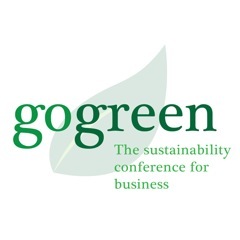Hunter Lovins moderated a panel for the Bard MBA at the GoGreen NY conference on September 26th. The discussion focused on “Driving CSR Through Stakeholder Strategies “, and featured Diana Glassman, Head of Environmental Affairs at TD Bank; Julie Mackenzie, Senior Advisor in Sustainability at the United Nations; Hervé Houdré, Manager of the Intercontinental New York Barclay Hotel; and Dr. Steve Cohen, COO of the Earth Institute at Columbia University.
 Conversation centered on stakeholder engagement—particularly employee and management engagement. Motivating Glassman’s work, for example, were the four questions that her bosses wanted answered: “How does this make me money? How does it save me money? What does it do for my employees? And what does it do for my customers?”
Conversation centered on stakeholder engagement—particularly employee and management engagement. Motivating Glassman’s work, for example, were the four questions that her bosses wanted answered: “How does this make me money? How does it save me money? What does it do for my employees? And what does it do for my customers?”
Glassman’s innovative employee engagement initiative at TD Bank—just released as a Net Impact case study— has focused on gathering concrete data to answer questions number 1 and 2. Through employee responses to surveys, and working with metrics that TD managers already accept as important, she hopes to quantify how employee engagement around sustainability can improve productivity and retention.
At the UN, Mackenizie’s challenge has been employee awareness. When she first took on the role, she said, UN employees in NYC were disposing of two thousand, purchased plastic water bottles daily. Her team collected the empties, and hung them in bags at the entrance of the UN, so employees had to thread their way through on the way to work. This launched a successful initiative to reduce waste at the UN Headquarters. Greening UN operations is critical to provide the organization with the moral authority to engage member states with demanding sustainability targets ranging from water to climate and energy.
Houdré has worked to influence fellow hoteliers through his role as chair of the Sustainable Hospitality Committee of the New York Hotel Association. He also focuses on engaging customers. His hotel serves local and organic food, and he composts all of his waste on site, using the resulting compost in a rooftop garden where he also keeps bees.
Cohen echoed the key theme of the panel that employee engagement is the key to driving far-reaching sustainability initiatives. Lovins closed out the session, pointing to Gallup’s finding that engaged organizations have almost 4 times the earnings per share growth rate of companies in the same industry that lack engagement, and 16 percent higher profitability. She also referenced an Economist Intelligence Unit study showing that engaging employees on sustainability is a powerful motivating tool, with improved customer satisfaction, increased productivity, and reduced employee turnover and absenteeism.
By, Eban Goodstein, Director of the Bard MBA in Sustainability & Director to the Bard Center for Environmental Policy